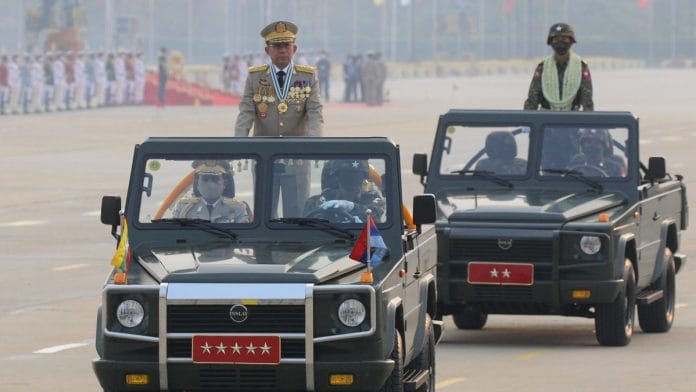Guwahati/New Delhi: Leaders of civil society organisations in Mizoram have said they will launch a medical assistance mission across the India-Myanmar border to assist victims of a Myanmar Air Force raid on an insurgent camp.
Two air raids Tuesday and Wednesday targeted a base used by guerrillas battling Myanmar’s military regime, killing five people and injuring 12, including two children, government and local sources told ThePrint.
Five bombs targeting the camp, located 10 kilometres across the India-Myanmar border from the village of Farkawan in Mizoram, were dropped by combat jets Tuesday, local residents told ThePrint. Three hit the camp, while two detonated in the bed of the Tiau river, which runs along the border.
Four more bombs were dropped Wednesday.
“The people in Mizoram and Myanmar’s Chin state share the same history, the same tradition and the same forefathers,” said Mizo Students’ Union President Samuel Zoramthanpuia. “We cannot abandon our family at this time of crisis.”
Local residents had told The Guardian that two bombs landed on the Indian side of the border. Government sources in Aizawl, though, said the explosions took place in Myanmar territory, though one damaged the windscreen of a Mizoram-registered vehicle parked on the river bed.
The Myanmar Army, which seized power in a February 2021 coup d’etat, has been using air power in efforts to crush ethnic insurgencies across the country — killing dozens of civilians in an attack on Sagaing’s Depayin township last September and at a concert near the Kachin jade-mining center of Hpakant in October.
Kachin, Karen, Karenni, Shan and Chin states have seen the most severe air strikes, sometimes followed by ground operations in which hundreds of village homes are alleged to have been burnt down.
Linked by kinship and tribal ties to the ethnic-Chin communities in neighbouring Myanmar, Mizoram residents living along the border have been providing refuge to kin fleeing the violence. Forty families of CNA guerillas operating out of Camp Victoria are reported to have sought refuge in Mizoram earlier this year.
Formed in 2008, the CNA is the armed wing of the Chin National Front, one of several ethnic parties in Myanmar that have struggled for decades for greater federal autonomy. The CNA was among several insurgent groups which signed a peace treaty with the government in 2012, but the agreement disintegrated after a military junta took power two years ago.
Mizos have long expressed solidarity with the citizens of Myanmar. In July, a candlelight vigil was held for casualties of the Myanmar resistance movement, by citizens of the neighbouring country living in India alongside student organisations based in Mizoram.
“Mizoram cannot remain indifferent today. India cannot turn a blind eye to this humanitarian crisis unfolding right in front of us in our own backyard,” Mizoram Chief Minister Zoramthanga had said.
Local residents on both sides of the border enjoy freedom of movement into the other country, a measure put in place in response to the common ethnic heritage of the communities.
Fighting alongside India
Even though the Mizoram government has said it will block, elements of the CNA are believed to have had a key role in facilitating Operation Golden Bird — a cross-border Indian Army sweep targeting a weapons consignment being shipped from Bangladesh through Myanmar to the United Liberation Front of Asom, the All Tripura Tiger Force, and the People’s Liberation Army of Manipur.
The CNA, former Indian Army Brigadier Rumel Dahiya has recorded, agreed to provide information on the movements of the 200-member insurgent convoy as it neared the border in Mizoram and cut through the dense forests of Chin province.
According to an account by Rajeev Bhattacharya, Chin fighters had earlier agreed to escort the convoy through their territory, but only in return for a share of the weapons. The Northeast insurgents, however, refused to hand over part of the consignment, leading to betrayal of their movements.
Fighters from the CNA also claimed to have ambushed the convoy, killing six Northeast insurgents. The Myanmarese Army was reported to have killed 38 insurgents in encounters between 10 April and 4 May 1995. The Indian Army killed another 14.
Also read: Why white elephant democracy will fuel civil war in Myanmar, instability in India’s Northeast






